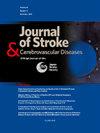Survey on neurological monitoring practices and clinician perspectives in acute stroke care
IF 2
4区 医学
Q3 NEUROSCIENCES
Journal of Stroke & Cerebrovascular Diseases
Pub Date : 2025-02-08
DOI:10.1016/j.jstrokecerebrovasdis.2025.108247
引用次数: 0
Abstract
Aims
To examine current practice and views regarding neurological assessment and monitoring across stroke services in the United Kingdom.
Methods
A cross-sectional survey of UK secondary care stroke services was conducted between December 2019 and September 2021.
Results
The response rate was 80 % (n = 125/156 services). Glasgow Coma Scale was the most frequently used routine neurological assessment (96 %). Variation in frequency, duration and response to monitoring was evident across all stroke types. Medical escalation was the most frequent response to neurological deterioration (99 %). Respondents acknowledged the importance of neurological monitoring, inadequacies of common tools, and supported further work to improve assessments and response protocols.
Conclusion
The extent of variation in clinical practice of neurological assessment and monitoring across the UK was unknown. Variation was found to be greater than anticipated. There is a need, and desire for, stroke type scenario-specific monitoring and standardised response guidance in acute stoke care. Introducing standardised care in this area would strengthen clinical protocols and could remove unwarranted variation in patient care ultimately improving outcomes.
Funding
Alison McLoughlin, Doctoral Research Fellow DRF-2018-11-ST2-074 was funded by the National Institute for Health and Care Research (NIHR) for this research. Some of the authors are funded by the NIHR Applied Research Collaboration North West Coast. The views expressed are those of the author(s) and not necessarily those of the NIHR or the Department of Health and Social Care.
求助全文
约1分钟内获得全文
求助全文
来源期刊

Journal of Stroke & Cerebrovascular Diseases
Medicine-Surgery
CiteScore
5.00
自引率
4.00%
发文量
583
审稿时长
62 days
期刊介绍:
The Journal of Stroke & Cerebrovascular Diseases publishes original papers on basic and clinical science related to the fields of stroke and cerebrovascular diseases. The Journal also features review articles, controversies, methods and technical notes, selected case reports and other original articles of special nature. Its editorial mission is to focus on prevention and repair of cerebrovascular disease. Clinical papers emphasize medical and surgical aspects of stroke, clinical trials and design, epidemiology, stroke care delivery systems and outcomes, imaging sciences and rehabilitation of stroke. The Journal will be of special interest to specialists involved in caring for patients with cerebrovascular disease, including neurologists, neurosurgeons and cardiologists.
 求助内容:
求助内容: 应助结果提醒方式:
应助结果提醒方式:


